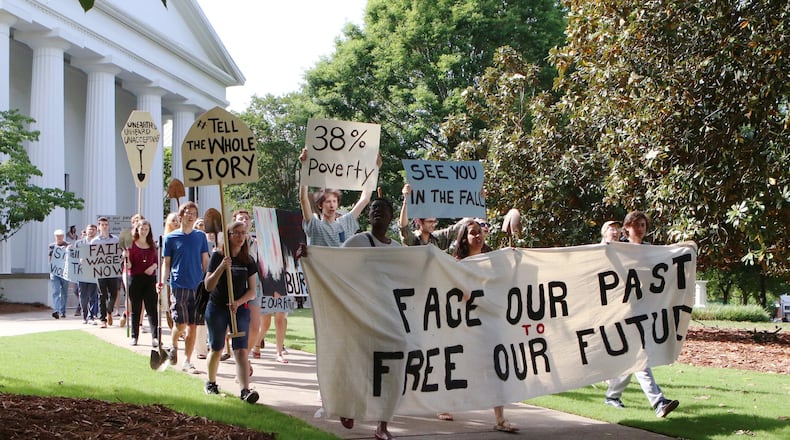A band of students at the University of Georgia hopes to prod the administration to move beyond conversations about past and present racism to corrective actions.
In this well-annotated essay, two founding members of the Beyond Baldwin Steering Group, a student organization dedicated to social and racial justice, outline the remedies they believe UGA should adopt.
Kyle Patel is a fourth-year UGA undergraduate student studying biology, international affairs, and public health. His advocacy efforts include work with Moms Demand Action for gun violence prevention and criminal justice reform with the Athens Anti-Discrimination Movement. Patel hopes to become a physician and practice community-based medicine that emphasizes a holistic vision of health care.
Phaidra Buchanan is a senior at the University of Georgia pursuing a degree in social studies education. Buchanan helped examine the university’s role in the institution of slavery and studied the lived experiences of enslaved people connected to the university as a member of the History of Slavery at UGA research team. She also volunteers with U-Lead, an organization working to ensure equal access to higher education for students of immigrant families. She plans a career as a teacher who fosters criticality, compassion, and joy and advocates for policies that empower students and communities.
By Phaidra Buchanan and Kyle Patel
Chartered in 1785 as the nation’s first public university, the University of Georgia prides itself as the birthplace of public American higher education. But throughout its history, the university has frequently resisted calls for equality and justice: profiting from slave labor during the antebellum period, failing to integrate its campus until 1961 and refusing to adequately confront incidences of racism on campus to this day.
The year is now 2021, and we, as UGA students and members of the Beyond Baldwin Steering Committee, urge the university to recognize its legacy of racial intolerance and accept our demands to take bold action against contemporary injustices.
UGA has long failed to acknowledge its history of oppression, instead enacting superficial solutions that are not commensurate with the harm it has caused. The university recently erected campus markers to recognize historically Black fraternities and sororities, while its Equal Opportunity Office was powerless to reprimand white fraternity students who pretended to be slaves and slave owners.
A research group has been tasked to study the history of slavery at UGA, but researchers are prohibited from connecting the past atrocities they find to our present-day context. The university recently created two committees to address systemic racism, but their meeting minutes and budgetary allocations are not regularly publicized and lack input from the Athens community.
In 2019, the university disregarded community concerns about how to properly deal with the remains of enslaved individuals that were found under Baldwin Hall. When Black descendants of Linnentown, an African American community that UGA bulldozed in the 1960s to make room for dorms, called for redress, the university largely ignored them. These continuing harms create an atmosphere of mistrust that alienates current students, staff, and faculty as well as a large proportion of potential students in the state of Georgia that the university is tasked to serve.
Georgia and Clarke County Public Schools are 32% and 50% Black respectively, yet only 8% of UGA undergraduates are Black, according to 2019 data. Forty-four percent of service and maintenance workers at the university are Black, making far less than livable wages, while only 5% of faculty are Black. The disparities in representation and inequality are rooted in the university’s legacy of complicity in slavery and its continued failure to meaningfully confront systemic racism.
These realities are difficult to grapple with, but there are tangible solutions that can be pursued right now. None of the solutions we mention are original. Rather, they are a collage of suggestions UGA has been receiving from the community in movement after movement. We center our calls to action around four elements: acknowledgement, transparency, workers’ rights, and recruitment.
Acknowledgement: Goal: UGA publicly committing itself to being part of the solution rather than contenting itself with the assumption that it is no longer part of the problem
Transparency: Goal: stakeholders being both informed of and brought into the decision-making processes that shape their experience in the UGA/Athens community
Workers' Rights: Goal: workers having the protections and compensation they deserve for making UGA what it is without layoffs as a result
Recruitment: Goal: creating a campus climate and intellectual community that contain and embrace multiple perspectives -- an atmosphere that sends a welcoming message to those considering filling our shoes
We call on the University of Georgia’s leadership to acknowledge and accept our demands for change. The demands have been created by current students and are informed by years of hard work from local activists, including faculty members. They are also now supported by the Franklin College Faculty Senate, the Mary Frances Early College of Education Faculty Senate, the College of Education’s Staff Representative Group, and the School of Social Work.
We encourage everyone to sign our petition calling for acceptance of these demands by the university. We are tired of the status quo, and we want change. It’s time for UGA to listen.
About the Author
The Latest
Featured





